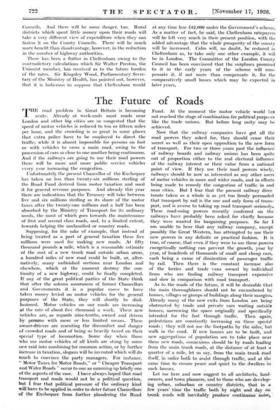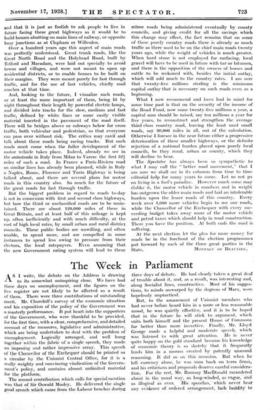The Future of Roads
THE road problem in Great Britain is becoming acute. Already at week-ends most roads near London and other big cities are so congested that the speed of motor vehicles is reduced to ten or fifteen miles per hour, and the crowding is so great in some places that extra police have to be employed to direct the traffic, while it is almost impossible for persons on foot or with vehicles to cross a main road, owing to the procession of ears so close to one another being continuous. And if the railways are going to use their road powers there will be more and more public service vehicles every year increasing the congestion.
Unfortunately the present Chancellor of the Exchequer has taken no less than twenty-six millions sterling of the Road Fund derived from motor taxation and used it for general revenue purposes. And already this year there are indications that the Treasury will take between five and six millions sterling as its share of the motor taxes after the twenty-one millions and a half has been absorbed by the Ministry of Transport for its ordinary needs, the most of which goes towards the maintenance of first and second class roads, and, to a limited extent, towards helping the unclassified or country roads.
Supposing, for the sake of example, that instead of being treated as a part of general taxation these five millions were used for making new roads. At fifty thousand pounds a mile, which is a reasonable estimate of the cost of a new trunk road outside urban areas, a hundred miles of new road could be built, or, alter- natively, many unfinished sections near London and elsewhere, which at the moment destroy the con- tinuity of a new highway, could be finally completed. If any of the great political parties of the State think that after the solemn assurances of former Chancellors and Governments it is a popular move to have taken money levied on motor vehicles for the general purposes of the State, they will shortly be disil- lusioned. Motor vehicles on our roads are increasing at the rate of about five thousand a week. These new vehicles are, as regards nine-tenths, owned and driven by persons with more or less limited means. These owner-drivers are resenting the discomfort and danger of crowded roads and of being so heavily taxed on their special type of locomotion. Some day when those who use motor vehicles of all kinds are stung by some new raid into combining for common action, or by further increase in taxation, slogans will be invented which will do much to convince the party managers. For instance, " Motor Taxes for Motor Roads," or " Cheaper Transport and Wider Roads " occur to one as summing up briefly one of the aspects of the case. I have always hoped that road transport and roads would not be a political question, but I fear that political pressure of the ordinary kind will have to be applied in order to deter future Chancellors of the Exchequer from further plundering the Road Fund. At the moment the motor vehicle world Ilea not reached the stage of combination for political purposes like the trade unions. But before long unity may be achieved.
Now that the railway companies have got all the road powers they asked for,- they should cease their secret as well as their open opposition to the new form of transport. For two or three years past the influence of railway boards and railway unions has been quite out of proportion either to the real electoral influence of the railway interest or their value from a national point of view. If they use their road, powers wisely, railways should be now as interested as any other users of motor vehicles in more and wider roads, and in efforts being made to remedy the congestion of traffic in and near cities. But I fear that the present railway direc torate taken as a whole is as yet too firmly persuaded that transport by rail is the one and only form of trans- port, and is averse to taking up road transport seriously: These road-using powers recently conferred on the railways have probably been asked for chiefly because they were wanted for bargaining purposes. So far I am unable to hear that any railway company, except possibly the Great Western, has attempted to use their new powers in any definite or practical fashion. It is true, of course, that even if they were to use these powers energetically nothing can prevent the growth, year by year, of hundreds of thousands of small and cheap cars, each being a cause of diminution of passenger traffic by rail. Then there is the constant increase also of the lorries and trade vans owned by individual firms who are . finding railway transport expensive and slow in comparison with road transport.
As to the roads of the future,. it will be desirable that the main thoroughfares should not be encumbered by houses, villages or groups of buildings along their margins. Already many of the new exits from London are being obstructed by trade and private cars waiting outside houses, narrowing the space originally and specifically intended for the fast through traffic. Then again, pedestrians are constantly increasing on these special roads ; they will not use the footpaths by the- Sides, but walk in the road. If new houses are to be built, and new aggregations of population are to take plaCe near these the roads, connexions should be by roads leading from the main trunk roads, at the distance of at least a quarter of a mile, let us say, from the math trunk road itself, in 'orderboth to assist through traffic, and at the same time to ensure peace and quiet to the dwellers in such houses. m Let e here and now suggest to all architects, land- owners, and town planners, and to those who are develop- ing urban, suburban or country districts, that in a few years' time the traffic both- by night and day On think roads will inevitably produce continuoUS noise, and that it is just as foolish to ask people to live in future facing these great highways as it would be to build houses abutting on main lines of railway, or opposite busy junctions as at Clapham or Willesden.
Over a hundred years ago this aspect of main roads was perfectly understood. Great trunk roads, like the Great North Road and the Holyhead Road, built by Telford and Macadam, were laid out specially to avoid towns and villages, and were not meant to open up residential districts, or to enable houses to be built on their margins. They were meant purely for fast through traffic, and for the use of fast vehicles, chiefly mail coaches at that time.
And, looking to the future, I visualize such roads, or at least the more important of them, being lit by night throughout their length by powerful electric lamps, and divided into tracks for the slow, medium and fast traffic, defined by white lines or some easily visible material inserted in the pavement of the road itself. There will be bridges above or subways below for cross traffic, both vehicular and pedestrian, so that everyone can pass over without risk. The critics may cavil and talk about these roads being racing tracks. But such roads must come when the fuller deVelopment of the motor vehicle takes place. Indeed, already we .see in the autostrada in Italy from Milan to Varese the first 52f miles of such a road. In France a Paris-Riviera road on similar lines has already been planned, while in Italy a Naples, Rome, Florence and Turin Highway is being talked about, and there are several plans for motor roads in this country also. So much for the future of the great roads for fast through traffic.
But the biggest problem in regard to roads to-day is not in connexion with first and second class highways, but how the third or unclassified roads are to be main- tained. There are about 120,000 miles of these in Great Britain, and at least half of this mileage is kept up, often inefficiently and with much difficulty, at the cost of high local rates, by small urban and rural district councils. These public bodies are unwilling, and often unable, to spend more, and are compelled in some instances to spend less owing to pressure from their electors, the local ratepayers. Even assuming that the new Government rating system will lead to these minor roads being administered eventually by county councils, and giving credit for all the savings which this change may effect, the fact remains that on some of these purely country roads there is already as much traffic as there used to be on the chief main roads twenty years ago, while the weight of vehicles is much greater.
When hard stone is not employed for surfacing, local gravel will have to be used in future with tar or bitumen, and there is the opposition of the owners of horses and cattle to be reckoned with, besides the initial outlay, which will add much to the country rates. I am sure that twenty-five millions sterling is the minimum capital outlay that is necessary on such roads even as a beginning.
What I now recommend and have had in mind for some time past is that on the security of the income of the Road Fund, now some twenty-five millions a year, a capital sum should be raised, say ten millions a year for five years, to reconstruct and strengthen . the average third class country road, leaving the least used small roads, say 30,000 miles in all, out of the calculation. Otherwise I foresee in the near future either a progressive deterioration of these smaller highways, or the definite rejection of a national burden placed upon purely local councils, be they rural, urban or county, which they will decline to bear.
The Spectator has always been so sympathetic to. what I may call the " better road movement," that I am sure we shall see in its columns from time to time editorial help for many years to come. . Let us not go on living in a fool's paradise. However much some may dislike it, the motor vehicle in numbers and in weight has outgrown the older main roads and laid an intolerable burden upon the lesser roads of this country. Every week over 5,000 more vehicles begin to use our roads, while the Chancellor of the Exchequer with every suc- ceeding budget takes away more of the motor vehicle, and petrol taxes which should help in road construction. There you have the position. At both ends the road is suffering.
At the next election let the plea for more money for roads be in the forefront of the election programmes put forward by each of the three great parties in the







































 Previous page
Previous page